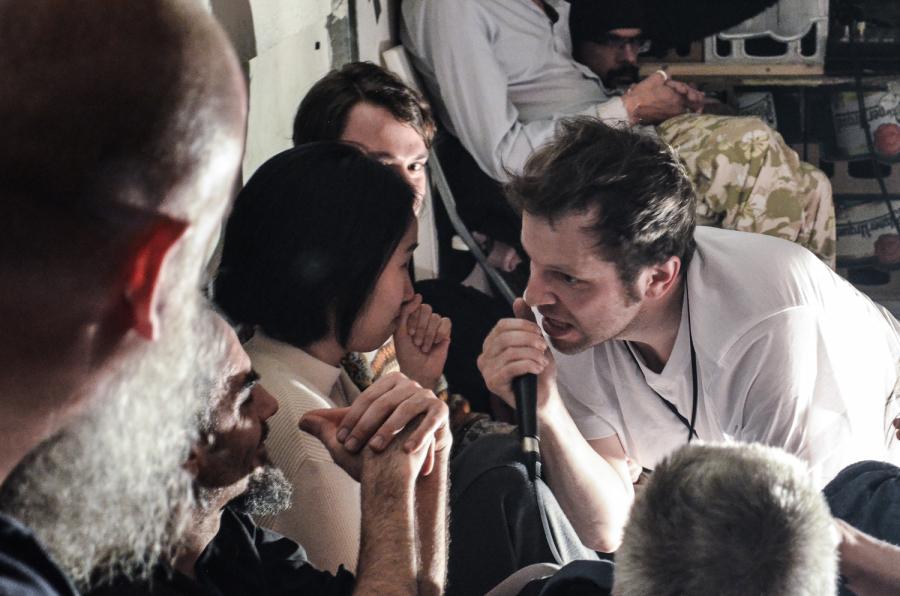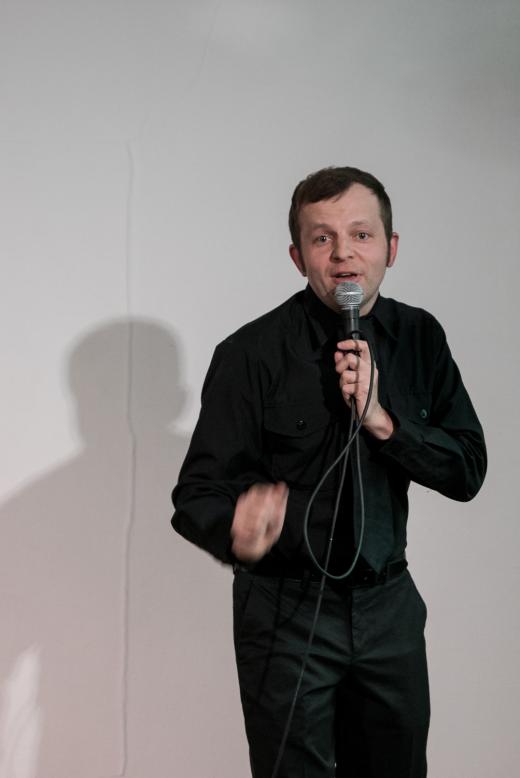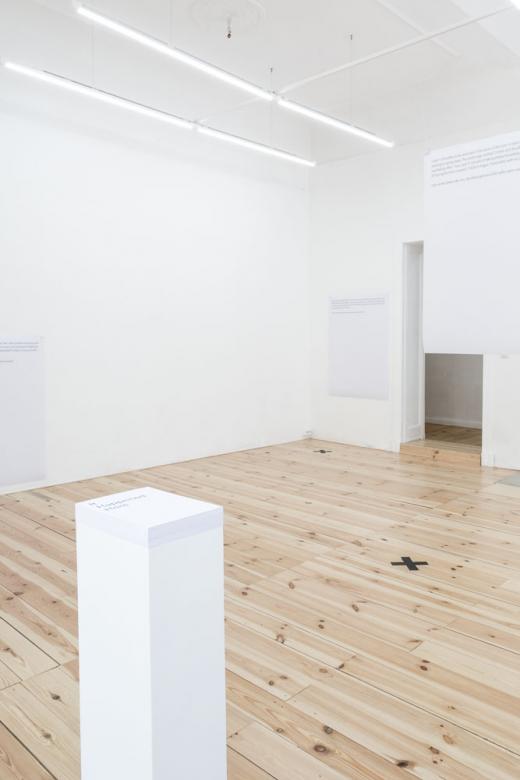Antagonistic Sharing: On the Performances of Aleks Słota
Antagonistic Sharing: On the Performances of Aleks Słota

"Nice is boring," asserts Aleks Słota, emphasizing again that he's not here to make people feel good. The Berlin-based artist doesn't mince words though he certainly tests their boundaries. During his performances, words can lose their meaning and disintegrate into blind rhetoric, affect or chaos. Discomfort, nervousness, and even provocation play key roles in Słota's practice. He often transgresses the traditional performer/audience divide with "in-your-face" tactics, or by performing in public spaces without an apparent context for his actions. Concerned with the unspoken forms of daily routine and human interaction, the artist tests the boundaries of behaviour to open new ways of making connections with each other and the world. The results are varied. At their most extreme, Słota has been choked by an audience member. At their best, he's made a few friends. Community is not a smooth plain where we all get along, but also, and perhaps especially, a series of confused, antagonistic relations. According to Słota, these have their rightful place as well.
Słota's antagonism is also self-directed. In a recent show at Exgirlfriend Berlin, "It Happened Here", he exhibited a series of white posters featuring short, deadpan texts describing the solitary, quasi-shameful acts he supposedly performed in the gallery space. At the end of each text he describes how the action made him feel, which is almost always a variation on the same thing: "This did not make me feel better." His lonely activities are ones most of us can easily identify with — over-eating and masturbation, for example — and they are weighted with an equally relatable sense of aimless futility. It's this same futility that pushes his public performances into the realm of absurdity. When he confronts his audience, often through a loud speaker, he attempts to make them aware of the forms that structure our daily interaction. Słota asks us how we make links, where we draw boundaries and attempts to test those arbitrary lines no matter where they lie. He wants to emphasize that all lines can be redrawn, though such a radical openness also calls for ethical vigilance. And here the artist speaks very soberly of responsibility.
I'm surprised you said an in-person interview makes you nervous. Nerves and awkward feelings are, after all, what your work is about.
AS: An interview is different. It's all over the place. A performance generally has a direction. If I have a monologue that's improvised, it still has a direction. Maybe it's the freedom of the interview that makes me nervous.
You're not as in control.
AS: I don't know if I would agree with that. In the performances I like the moment when I'm out of control, when something happens that's unexpected. That's always invigorating for me. How am I going to deal with this? That's why I've recently been doing more improvised speech performances. In the sphere of the performance, I think it works better than in an interview, this kind of getting lost on tangents. I think I tend to do that.
What kind of improvised speech performances are you doing?
AS: The last I did was "Meat Puppet". I had a teleprompter feed me a list of words from a website that generates random English words. It's really everything; no proper names, but nouns and and adjectives. So I was trying to string a speech together with these random words that I didn't know beforehand.

Aleks Słota, "Meat Puppet" @ Lettrétage (April 30, 2017). © Laure Catugier
When I listened to "Meat Puppet", and perhaps it's because of intonation or grammar, it seemed as if the speech was actually more or less coherent. Is there an algorithm through which the words are generated that allows them to make sense?
AS: No, the only algorithm is in my head. There are moments where I freak out a bit, because the words are so random. Because of this, there are these absurd breaks in the performance, which also works really well. It ends up looking like there is this raving lunatic, this populist politician, and he has these breaks in his head, these flights of fancy. They create a tension in the performance, and also its humour.
Can satire and comedy be a viable mode of resistance?
AS: Yeah, definitely. I always have this idea of the jester in mind, the one who was allowed to speak the truth in the king's court. He can speak truth to power. I think this is the situation in the United States right now. Saturday Night Live is having its biggest season ever because of this guy.
I've also been thinking about this. I feel as if Trump is making humour irrelevant, because he is so openly a joke himself. Jokes have no role anymore.
AS: They do because he's such a thin-skinned person. He's so easy to anger. This is why people love poking him, because he reacts. It makes people that do comedy feel more powerful, perhaps more than they actually are.
How is resistance important in your work in particular?
AS: Very important. But it begs the question: what am I resisting? When I do performances in public, it's very basic a lot of the time. It's about our normalized and socialized way of behaving in public and trying to subvert that. I sound very utopian but I think there is a glimmer of hope there. I want people to see that they can move outside the box, and do a weird thing, whatever their motivation might be.
Ultimately, I don't think art can change anything except for people's perception of reality. But that's a powerful thing already. I'm working on a project in Sardinia on the writings of Antonio Gramsci and his idea of culture that is created by the working class, and not given to them by the bourgeoisie. The project is funded by the government of Sardinia and EU money. So they are sponsoring a project about someone whose whole point was to get away from this sort of top-down movement of culture. Now it's my job to critique the system. I can't just do a performance about Antonio Gramsci, but also about where I'm getting the money and how I am honouring his tradition.
My personal draw to your show "It Happened Here" at Exgirlfriend was through literature. The pages in the gallery reminded me of the poems of Daniil Kharms, a Russian absurdist writer who was arrested in 1941 for distributing "defeatist statements". Then I came and saw your statements which are all written in a specific form and all kind of whimper off in the end. Is literature or text coming to play a larger part in your work?
AS: It is with this exhibition. I'm not so familiar with Eastern European literature traditions but I'm interested in Eastern European absurdist comedy — the way of dealing with oppression through absurdity. I'm reading this book about performance art in Eastern Europe since the 1960s and the author identifies a few strategies that I've been thinking about but never put into words. One is the idea of "over identification", where you over-identify with your oppressor. The Polish performance collective Orange Alternative is a good example. The other is the idea of "subversive affirmation", where you go through the motions the system expects you to perform, but everyone who sees the performance knows it is ironic. When you are viewing from the outside, and have no idea of the situation, you don't see the double meaning. To me, these are both absurd modes of doing things. I think in a Polish context, under Communism, they were an effective way of making work that was political but was also interesting.

Aleks Słota, "It Happened Here" @ Exgirlfriend Gallery, Berlin (May 12 – June 2, 2017). © Aleks Słota
My personal experience of being a Pole who grew up in the West makes me feel like I have a foot on either side of the East/West divide. Here there is the sense that Poles are poor and disenfranchised, and in the art world, Polish artists are very fashionable. But as someone who grew up in North America, where the dichotomies are differently positioned, the inequalities centre more around white privilege.
AS: I don't consider myself Polish or American. In America, I pass as American and in Poland, I also fit in very easily.
It feels parochial to ask about nationality these days.
AS: But it does make a difference sometimes. In Neukölln I was doing a performance that irritated these young Turkish guys. I ended up talking to them and telling them what I was doing, at which point they asked where I was from. I had to quickly make a decision. Am I this ugly American coming to gentrify their neighbourhood or am I this scrappy little Polish guy from across the border? And I said, “I'm Polish.” And everything was ok after that. But I don't consider myself to be either. I can be whatever I want, in a way.
One of the ways you interact with your audience is by trying to blur that performer/audience barrier. Sometimes the audience doesn't even know you're performing. Does that line ever blur for you on your side? Can you lose sight of that performance/audience divide?
AS: Once I have an idea, I cut away all the fat. That becomes the driving force of the performance. What happens sometimes in my sound performances is, when I'm in the moment, when I'm performing for the audience — when I'm performing, not for the audience, erase that — when I'm performing, and I become aware of thinking about my audience's expectations. This is when I realize it's gone off track a bit. I have to stop and say — fuck them. That is the only time the audience is dangerous to me, when I consider their opinions, their feelings.
There's a quote that I read but can't attribute it to anyone anymore. Something about the importance of an artist being willing to embarrass himself. Your work touches on these boundaries of shame, especially the private performances you did at Exgirlfriend — from over-eating until you vomit to masturbating to the image of Donald Trump. Can you speak more to embarrassment and shame in your practice?
AS: I think embarrassment and shame come from failure, from my openness to failure when I perform. I don't do things to intentionally embarrass myself. A performance can always lead to the potential for embarrassment, especially when people are watching me. Though in the moment, when I'm in the performative sphere, I don't think anything could embarrass me. Now I feel like that is a challenge for people to do something that could embarrass me but... good luck.
* * * * *
More about Aleks Słota at:
www.aleksslota.com
The interview was conducted by the artist and writer Dagmara Genda.
www.dagmaragenda.com